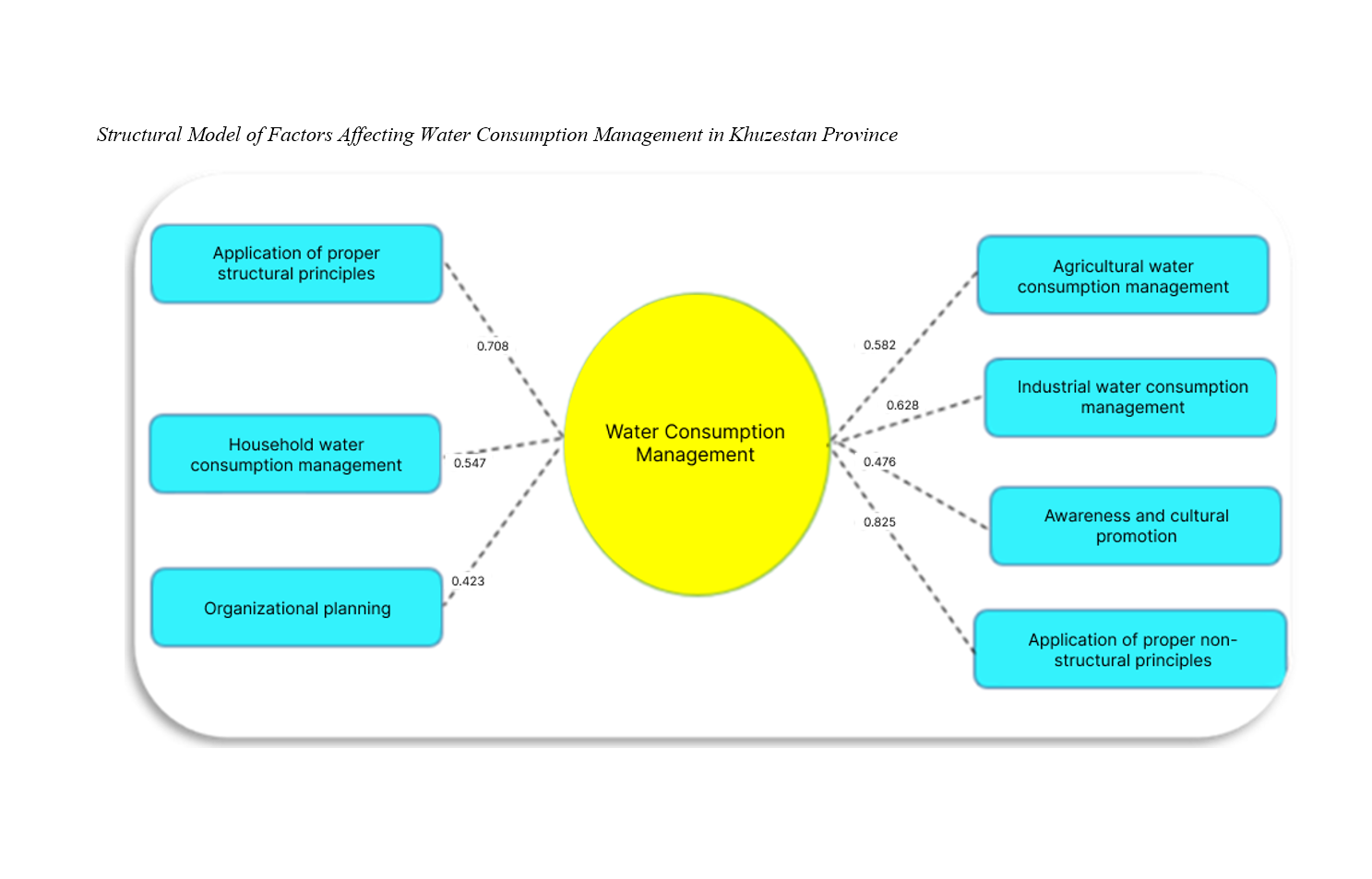Identifying and Ranking the Factors Influencing Water Resource Consumption Management in Khuzestan Province: A Qualitative Approach
Keywords:
Water, Water Resources, Consumption Management, Khuzestan Province, Qualitative ApproachAbstract
The objective of the present article is to identify and rank the factors influencing water resource consumption management in Khuzestan Province using a qualitative approach. Data collection was conducted through library research and fieldwork in the form of interviews. The research method employed was qualitative, carried out through interviews with experts. The study involved 20 participants, including specialists, university professors in the field of water management, and managers from organizations involved in water resource management within Khuzestan Province. (Considering theoretical saturation, participants were selected based on their sufficient expertise in water consumption management.) Data analysis was performed using MAXQDA software, version 22. According to the experts, seven main factors influencing water consumption management were identified. Each of these seven factors included several sub-factors or components. The first factor was the implementation of proper non-structural principles, within which 15 sub-factors related to water consumption management were identified. The second factor was the implementation of proper structural principles, which included 17 sub-factors. The third factor was public awareness and cultural promotion in consumption management, which encompassed 13 sub-factors. The fourth factor focused on consumption management in the domestic sector, with 13 associated sub-factors. The fifth factor pertained to consumption management in the industrial sector, with 11 identified sub-factors. The sixth factor related to organizational planning, which included 13 sub-factors. The seventh factor concerned consumption management in the agricultural sector, within which 32 sub-factors were identified. Based on expert prioritization, the ranking of the factors influencing water consumption management in the Khuzestan plain was as follows: (1) implementation of proper non-structural principles, (2) consumption management in the industrial sector, (3) implementation of proper structural principles, (4) consumption management in the agricultural sector, (5) public awareness and cultural promotion, (6) consumption management in the domestic sector, and (7) organizational planning. The results regarding the significance of these factors indicated that all variables affecting water consumption management were statistically significant at the 95% confidence level using the system dynamics approach. This model demonstrates that the factors extracted from expert interviews have a substantial impact on water consumption management.
References
Ahadzadeh, A., Sayadshirkosh, S., & Jamshidi Ivanaki, M. (2021). Effectiveness of Public Policy Implementation: A Case Study of the Ministry of Energy. epprjournal, 6(4), 167-205. http://epprjournal.ir/article-1-887-en.html
Barghi, H., & Ghanbari, Y. (2018). Optimal Water Resource Planning and Management and Its Role in Reducing Drought Effects. The Second National Conference on Drought Impacts and Management Strategies,
Barikani, A., Ahmadian, M., Khalilian, S., & Chizari, A. (2019). Sustainable Integrated Use of Surface and Groundwater Resources in Determining the Optimal Cultivation Pattern of Qazvin Plain. Journal of Agricultural Economics and Development. https://aead.agri-peri.ac.ir/article_58736.html?lang=en
Barzegari Banadkouki, F., Akrami, S., & Sharghi, T. (2021). Investigating Factors Affecting the Development and Scientific Output of Sustainable Water Resource Management in Different Countries. Journal of Water Management in Agriculture, 8(2). https://wmaj.iaid.ir/article_136451.html?lang=en
Chen, W. B. (2022). Optimal allocation of stormwater pollution control technologies in a watershed Ohio State University. https://www.researchgate.net/publication/272505086_Optimal_Allocation_of_Stormwater_Pollution_Control_Technologies_in_a_Watershed
Chitsazian, M., Shajeri, S., Mirzaei, Y., & Oboudi, T. (2021). Evaluation of Water Resource Mixing in Karst Aquifers: A Case Study of the Karst Spring of Garu in Eastern Khuzestan. Journal of Applied Geology. https://aag.scu.ac.ir/article_13231.html
Cohen, J. A. (2018). International Law and the Water Politics of Euphrates. Journal of International Law and Politics, 24.
Khoda Shenas, S., & Tajbakhsh, M. (2021, March 1-2). Utilizing Modern Urban Flood Control Methods for Optimal Water Resource Use. Proceedings of the National Conference on Water Resource Development, Zahedan, Iran.
Klass, E. E. (2020). Potential for Water Wars in the 21st Century. Presentation to College for Seniors Lecture Series, Iowa State University.
Loucks, P. (2020). Water Resources Management: Focusing On Sustainability.
Mazaheritehrani, M., Alvani, M., Vaezi, R., Zahedi, S., & Qorbanizadeh, V. (2023). The Model Of Green Management for Iranian public organizations. Iranian journal of management sciences, 17(68), 1-43. http://journal.iams.ir/article_389.html
http://journal.iams.ir/article_389_df76bdb960e240517d09750310cd8864.pdf
Mehrabi, A., Heidarpour, M., & Safavi, H. (2022). Integrated Management of Surface and Groundwater Resources Under Water Scarcity Conditions in the Western Qazvin Irrigation Network. Iranian Journal of Water Research, 15(1). https://iwrj.sku.ac.ir/article_10756.html?lang=en
Mehrabi, E., Heydarpoor, M., & Safavi, H. (2022). Examining Integrated Consumption Management of Surface and Groundwater Resources Under Water Scarcity Conditions in the Western Irrigation Network of Qazvin Plain. Iranian Water Research Journal, 15(1).
Mirzaei, Y., Zarasvandi, A., & Orang, M. (2020). Investigating the Geochemical Impact of Asmari Oil Reservoirs on Karst Water Resources in Masjed Soleyman. Journal of Advanced Applied Geology, 18. https://sid.ir/paper/521147/fa
Rezaei, M., & Abajelou, N. (2019). Investigating Surface Water Resource Management Using Open-Source GIS Software. The Third National Conference on GIS Applications in Water and Power Industry Management,
Soleimani, M. (2019). Risk Assessment and Prioritization in the Construction and Operation of an Urban Surface Water Collection and Conveyance Network Amirkabir University, Tehran.
Soltani, G., & Zibaei, M. (2020). Agricultural Water Consumption Management: Challenges for Coping with Drought. Conference on Water Consumption Optimization in Iran,
Swain, A. (2018). Managing Water Conflict; Asia, Africa and the Middle East. Routledge. https://books.google.com.pe/books?id=-yKytuKmzAMC&source=gbs_navlinks_s
Weiss, P. T., Gulliver, J. S., & Erickson, A. J. (2022). Cost and Pollutant Removal of StormWater Treatment Practices. ASCE Journal of Water Resources Planning and Management, 133(3), 218-229. https://doi.org/10.1061/(ASCE)0733-9496(2007)133:3(218)

Downloads
Published
Submitted
Revised
Accepted
Issue
Section
License
Copyright (c) 2024 Ghorban Zeidvand (Author); Gholam Reza Hashemzadeh khorasgani; Aboutorab Alirezaei (Author)

This work is licensed under a Creative Commons Attribution-NonCommercial 4.0 International License.









